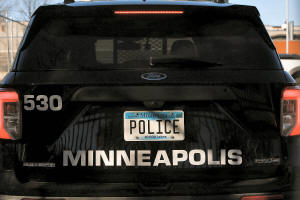Jury to decide if Minneapolis police violated George Floyd's rights
 Send a link to a friend
Send a link to a friend
 [February 23, 2022]
By Jonathan Allen [February 23, 2022]
By Jonathan Allen
ST. PAUL, Minn. (Reuters) - A jury was due
to begin deliberating on Wednesday on whether three former Minneapolis
police officers deprived George Floyd of his constitutional rights by
failing to come to the aid of the handcuffed Black man pinned beneath a
colleague's knee.
Tou Thao, 36; J. Alexander Kueng, 28; and Thomas Lane, 38, all testified
in their own defense in the federal trial at the U.S. District Court in
St. Paul, telling jurors they did not realize at the time that Floyd was
in dire need of medical care, which it was their duty to provide.
Their lawyers in defense summations said prosecutors had failed to prove
the three men acted with deliberate indifference during the May 2020
arrest, even as they had what a prosecutor called "front-row seats" to
Floyd's murder beside a police car parked in a Minneapolis intersection.
Thao and Kueng are also charged with willfully breaching Floyd's rights
by not intervening in the use of excessive force by their colleague
Derek Chauvin. A widely seen cellphone video showed Chauvin, who is
white, kneeling on the neck of the prone Floyd for more than 9 minutes
as horrified onlookers begged the officers to check Floyd's pulse.
Floyd's killing sparked protests in cities around the world against
police brutality and racism. Thao is Asian American, Kueng describes
himself as mixed race and Lane is white.
Chauvin, 45, was convicted of Floyd's murder at a separate state trial
last year and sentenced to 22-1/2 years in prison; in December, he
pleaded guilty to the federal charges of violating Floyd's rights.

U.S. District Judge Paul Magnuson said he would instruct the 12 jurors
in the law before giving them the case for deliberations.
In closing arguments on Tuesday, defense lawyers said the officers
deferred to the authority of Chauvin, the most senior officer at the
scene with 19 years at Minneapolis Police Department.
[to top of second column]
|

A police vehicle is seen as the Minneapolis Police Departmentís
fifth precinct remains fenced and barricaded as voters decide
whether to abolish the police department and replace it with a new
department of public safety in the wake of George Floyd's murder in
Minneapolis, Minnesota, U.S., November 2, 2021. REUTERS/Nicole Neri

It was not obvious to them that Chauvin's knee on Floyd's neck amounted
to excessive force, they said, even as onlookers yelled at the officers
with growing alarm to get off Floyd, who begged for his life before
falling unresponsive.
Kueng and Lane, who first handcuffed Floyd on suspicion of using a fake
$20 bill in a nearby store, have noted they were rookies only a few days
out of training, which lasted more than a year. Thao, who had been in
the force for eight years, stood to the side of Floyd, keeping back the
bystanders.
In a final rebuttal on Tuesday, LeeAnn Bell, a federal prosecutor, said
there were no "free passes" under the U.S. Constitution, which
guarantees that people not face excessive force or be deprived of
medical care when the government takes them into custody.
"There's no pass for, 'I was a brand-new officer.' There's no pass for,
'It would have been hard or uncomfortable to speak up,'" she said. "Our
constitution weighs the risk and our constitution says you must act."
Medical experts have testified that Floyd almost certainly would have
survived the arrest if he had been rolled onto his side once the
officers restrained him, as the officers acknowledged they had been
taught to do.
All three men face years in prison if convicted, and are also due to
stand trial in a Minneapolis court in June on state charges of aiding
and abetting Floyd's murder.
(Reporting by Jonathan Allen in St. Paul, Minn.; Editing by Matthew
Lewis)
[© 2022 Thomson Reuters. All rights
reserved.] This material may not be published,
broadcast, rewritten or redistributed.
Thompson Reuters is solely responsible for this content. |